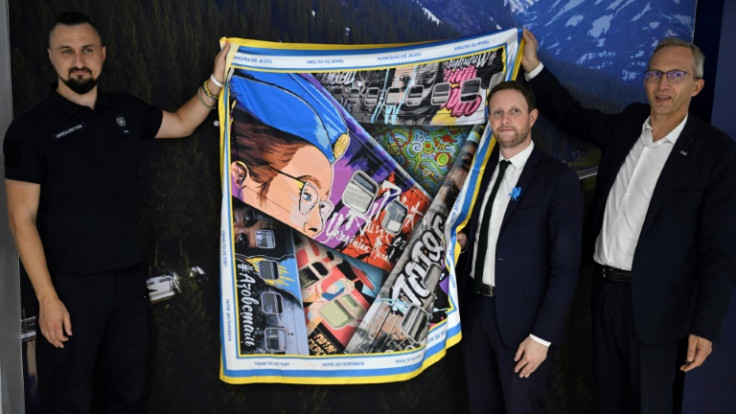'We Keep Running': Ukrainian Rail Unbowed In Face Of War

Ukrainian resilience in the face of the Russian onslaught also extends to its railways, proudly declares the head of the company that has kept trains running with nary a glitch since the war began.
Service hasn't completely stopped since late February "for more than two hours", despite the fighting across the country, Ukrainian Railways CEO Alexander Kamyshin told AFP at the InnoTrans trade fair in Berlin.
"We are on 210th day of the war. And no matter how heavily they shell us we keep running," Kamyshin said.
Some 8,000 railway workers are fighting in the Ukrainian military.
Since the Russian invasion began, Ukrzaliznytsia, the country's biggest public firm with 231,000 staff, has seen 244 employees killed, with 425 injured.
"That's the highest price because damaged infrastructure can be always rebuilt. But people? Lives and people skills: something we don't rebuild," said Kamyshin, who was invited to share a stand at the fair with Polish rail company PKP.
The remaining staff work amid the relentless bombing and are constantly rebuilding what has been destroyed, said the imposing young executive whose look -- the sides of his scalp shaved, setting off a black ponytail -- stand out amid the dark business suits at the industry gathering.
"We never stopped working for people. Never, not a single day," said Kamyshin, wearing a polo shirt emblazoned with his company's logo.
He said his staff had become experts in repairing bombed infrastructure, with only a sole complete breakdown lasting two hours.
We found out "how to fix everything so that (service) would never stop for more than two hours," he said.
Kamyshin said the railways were a vital lifeline for his battered country.
"Some days it was the only way to go through Ukraine," he said, citing major road damage.
"We restored the connection to Balakliya. That's the easiest way indeed" to reach the eastern city.
He noted that world leaders travelling to Kyiv to meet with Ukrainian President Volodymyr Zelensky, including a joint visit in June by France's Emmanuel Macron, Olaf Scholz of Germany and Italian Prime Minister Mario Draghi, was made possible by the rail network from Poland.
As soon as a new swathe of territory has been recovered from Russian forces, Ukrainian Railways sets to work stitching damaged lines back into the network. Thus a train left Kharkiv to reach Balakliya a week after the recapture by the Ukrainians.
"The government is supporting us financially." Kamyshin said, noting that the assistance was sorely needed since the company derived most of its revenue from cargo before the war.
Looking to the future, Ukraine hopes to one day join the European Union, which would also mean integrating its railways into the EU network.
Kamyshin strongly backs a European Commission proposal to unify the continent's railways at a quicker pace, which would mean changing the track gauge in countries where it is wider such as Ukraine, Moldova, the Baltic states and Finland.
"We already started that. There is no other way for us but to finally switch to (the) European standard gauge," he said.
However he has his work cut out for him: the Ukrainian rail network, constantly pounded by the Russian army, is the third largest in Europe with 23,000 kilometres (14,300 miles) of track, behind Germany and France.
© Copyright AFP {{Year}}. All rights reserved.





















